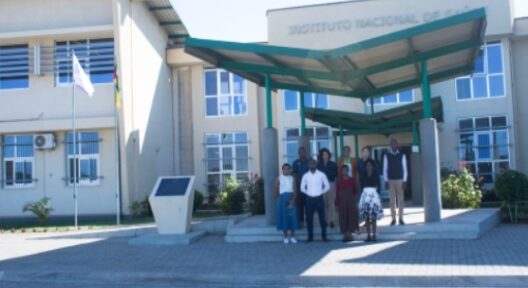COVIDSeq_NET – Corona Global
Application of Sequencing Technology to Elucidate SARS-CoV-2 Introduction and Dispersion in Mozambique

Description
The main goal of the COVIDSeq_NET project is to determine the genetic diversity of SARS-CoV-2 variants since the beginning of the outbreak in Mozambique. As part of our long-term collaboration between the Instituto Nacional de Saúde (INS) and the Research Center Borstel, Leibniz Lung Center (RCB), we will perform whole genome sequencing (WGS) of SARS-CoV-2 from different periods of the epidemic using Next Generation Sequencing (NGS) technology. Initially, NGS of SARS-CoV-2 samples will be performed at the RCB to get a first impression of the circulating variants. However, the aim is to implement the NGS technology very quickly in the laboratory in Maputo, so that virus sequencing and subsequent data analysis can be carried out locally. For this purpose, our local partners will be trained in the NGS technology and in the analysis of the generated sequence data.
Overall, this project will enable the establishment of a laboratory for SARS-CoV-2 NGS in Maputo and generate initial information for tracking SARS-CoV 2 infections. The results of the study will provide a better understanding of the molecular epidemiology and genetic characterisation of SARS-CoV-2 variants in Mozambique. This information will help authorities understand the identity of the virus, whether it is changing and how it is transmitted.
Project Objectives
The following objectives were considered highly relevant by all project partners:
- Determining the genetic diversity of SARS-CoV-2 since the beginning of the outbreak in Mozambique. Due to recent threat of new (and potentially more virulent) SARS-CoV-2 variants (variants of concern, VOC) in Africa, it is urgently needed to address the genetic profile of the virus samples that are currently circulating among the Mozambican population. A total of up to 300 collected samples will be shipped to RCB (Germany) in order to perform initial whole-genome sequencing (WGS). This information will help authorities to understand the identity of the virus, whether it is changing and how it is being transmitted
- Expanding the NGS capacity at INS and establishing SARS-CoV-2 sequencing based on the amplicon-based approach described by the ARTIC-NETWORK (https://artic.network/ncov-2019). The NGS technology will be performed on the iSeq 100 platform. The corresponding analysis workflows have already been established at the RCB. After installation of the sequencer and procurement of consumables, the workflows for NGS will be implemented locally in Mozambique. Local staff will be trained in all procedures necessary to perform SARS-CoV-2 NGS. In addition, workflows for data analysis and interpretation will be established locally. Local standard operating procedures (SOPs) will be developed together with RCB NGS experts
- Investigating the following aspects using the NGS laboratory established in Maputo:
- WGS from the first 50 confirmed SARS-CoV-2 cases in Mozambique will provide information on the very first infection phase, which variants entered the country and how they were transmitted
- Information on the infection history will be obtained by sequencing up to 30 samples/month collected from the beginning of the outbreak in March 2020 to June 2021
- For ongoing and future surveillance analyses, between 50 and 100 positive samples for SARS-CoV-2 will be sequenced per month and analysed in a timely manner from June/2021 to June/2022. All generated datasets will be investigated taking into account patient age and sex, infection rates, disease severity and mortality
Our goal for this project is that it can be sustained in Mozambique. This means that SOPs must be developed according to national guidelines so that the sequencing technology can be included in the country’s epidemic plans. However, as the current project is more of a start-up project, the German and Mozambican partners want to use the current funding phase to jointly develop a plan for molecular surveillance of infectious diseases in Mozambique for the period after 2023.
Last update: December 2021
